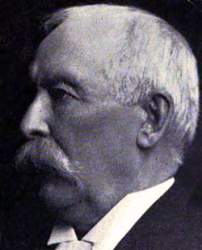Record Data
Original source
Owen Thornton Reeves, James Stevenson Ewing, Richard Price Morgan, Franklin Blades, John W. Bunn, Abraham Lincoln, by Some Men who Knew Him: Being Personal Recollections of Judge Owen T. Reeves, Hon. James S. Ewing, Col. Richard P. Morgan, Judge Franklin Blades, John W. Bunn (Bloomington, IL: Pantagraph Printing & Stationery Company, 1910), 45-49.
Type
Book
Date Certainty
Exact
Transcriber
Transcription adapted from Abraham Lincoln, By Some Men Who Knew Him
Adapted by John Osborne, Dickinson College
Transcription date
Transcription
During the years 1844 and 1845, my father, Mr. John W. Ewing, was the proprietor of the old National Hotel, on Front street, in the city of Bloomington. At that time circuit courts were held in McLean county, twice a year, and there were a number of lawyers from other counties who usually attended these terms. Amongst those whom I specially remember as coming from Springfield, and who were guests at my father's house, were Hon. James McDougal, afterward a Senator from California; Mr. John T. Stuart, and Abraham Lincoln. I thus became acquainted with Mr. Lincoln, and I continued to know him, as a boy knows a distinguished man whom he often meets, until 1860, when he was elected President of the United States.
Mr. Lincoln was fond of children. At least he knew many of the boys and girls of the village, the children of his older friends, and often talked to them and expressed an interest in their welfare. They liked Mr. Lincoln, and most of the boys in the town knew him and many of them talked to him, as we all thought, on most intimate terms.
In 1844, Mr. Lincoln was thirty-five years of age, in the very prime of his younger manhood, and during the following fifteen years (except one term of service in Congress) he "traveled the circuit," devoting most of his time to the practice of the law. When I first knew anything of courts, Hon. Samuel H. Treat was the presiding judge of this circuit. He was afterward appointed to the Federal bench, and the Hon. David Davis became his successor and continued as the circuit judge until appointed by Mr. Lincoln as an associate justice of the Supreme Court of the United States. It was then the habit for such lawyers as possessed sufficient experience and ability to attract a clientage to follow the court around the circuit. Mr. Lincoln was of this number and more than perhaps any other was most constant and unremitting in his attendance.
During these fifteen years, with the eager curiosity of a boy, I was a frequent attendant in the court room, and heard Mr. Lincoln try a great many law suits. The suits themselves often dealt with trivial matters, but great men were engaged in them. Mr. Lincoin was engaged in most of the suits of any importance. He was wonderfully successful. He was a master in all that went to make up what was called a "jury lawyer." His wonderful power of clear and logical statement seemed the beginning and the end of the case. After his statement of the law and the facts in any particular case, we wondered either how the plaintiff came to bring such a suit or how the defendant could be such a fool as to defend it. By the time the jury was selected, each member of it felt that the great lawyer was his friend and was relying upon him as a juror to see that no injustice was done. Mr. Lincoln's ready, homely, but always pertinent, illustrations and anecdotes could not be resisted. Few men ever lived who knew, as he did, the mainsprings of action, secret motive, the passions, prejudices and inclinations which inspired the actions of men, and he played on the human heart as a master on an instrument.
This power over a jury was, however, the least of his claims to be entitled a good lawyer. He was masterful in a legal argument before the court. His knowledge of the general principles of the law was extensive and accurate, and his mind was so clear and logical that he seldom made a mistake in their application. Courteous to the court, fair to his opponent, and modest and restrained in his assertions, he was certainly the model lawyer.



